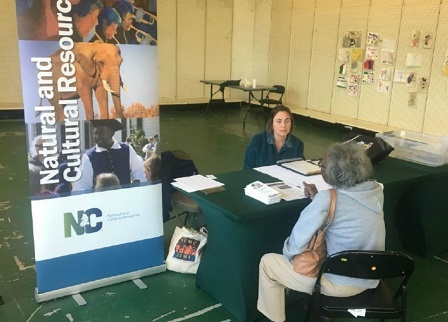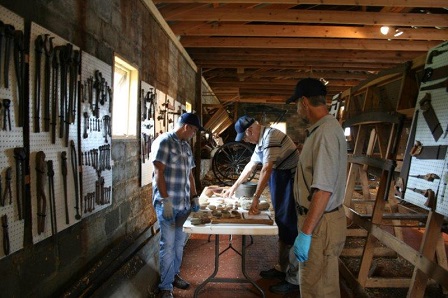Preserving Historic, Cultural Treasures in Matthew’s Aftermath
By Michele Walker
Cleaning and restoring historic documents and artifacts aren’t the first things most people think of as emergency response after a hurricane. But to the staff at the N.C. Department of Natural and Cultural Resources, it’s an important part of disaster recovery.
After Hurricane Matthew swept across N.C., department staff began mobilizing to help local communities and citizens restore irreplaceable treasures.

The DNCR Cultural Resources Emergency Support Team, or CREST, offers help after disasters to small public and private museums, libraries and other facilities, as well as advice to private citizens who want to clean and preserve their own documents and photos that have been damaged by flooding or other disasters.
“The department enlists dozens of experts from the coast to the mountains to help with disaster recovery of public and private cultural heritage collections,” says Adrienne Berney, CREST coordinator. “Our statewide responders join forces with Area Cultural Resources Emergency Network leaders and conservators to assist collecting institutions across North Carolina.”
Following Hurricane Matthew, CREST members scheduled workshops at FEMA disaster recovery centers in Lumberton and Tarboro to share information on properly cleaning and preserving personal documents and other family treasures damaged by the storm. They also developed a database of nearly 200 institutions in areas affected by the hurricane and worked with staff throughout the area to contact them and offer assistance.

When Tropical Storm Julia caused the Cashie River to flood the town of Windsor in September, CREST mobilized to assist the four-year-old Craftsman & Farmer’s Museum, which needed help restoring flood-damaged wooden and metal tools in its collection. CREST members based in Raleigh and eastern counties, along with three employees from the Museum of the Albemarle, spent several days cleaning and drying the wet artifacts on-site to stabilize them for exhibition. The museum flooded a second time after Hurricane Matthew, and the team continues to consult with town officials about next steps.
Also following Hurricane Matthew, State Archives staff reached out to veterans of the armed forces and N.C. National Guard whose military documents or photographs were damaged by the storm, offering advice and resources for their personal military records, military correspondence and photographs, military training manuals, and other archival items.
They also offered to assist with arrangements for temporary storage and with advice on decisions about retaining personal belongings in light of damage to their homes.
“We want all veterans affected by the storm to know that we care about them and preserving their history,” says military archivist Matthew Peek. “The recovery process for these service materials might take a while, but we are willing to take the time to try to assist them as much as possible.”

In addition to preserving historic and cultural treasures, the department worked to assist hurricane survivors in other ways. In partnership with the North State Journal and Waste Industries, DNCR sponsored a children’s book drive to replace books lost to flood waters. Thanks to this effort, more than 1,000 children’s books were delivered to shelters, schools and public libraries in storm-affected areas.
Through a partnership with the N.C. African American Heritage Commission, the department collected toiletries, tools, cleaning supplies and other items for residents of the historic town of Princeville, which started as a community of freed slaves at the end of the Civil War and later became the nation’s oldest town incorporated by African Americans.
The N.C. Museum of History also joined the Piedmont Council for Traditional Music, known as PineCone, in collecting canned foods for residents of eastern communities devastated by the hurricane’s aftermath, pairing two free “Music of the Carolinas” concerts with a drive benefiting the Food Bank of Central and Eastern N.C.
##
Michele Walker is a public information officer for the N.C. Department of Natural and Cultural Resources. The department includes 27 historic sites, seven history museums, two art museums, two science museums, three aquariums and Jennette’s Pier, 39 state parks and recreation areas, the N.C. Zoo, the nation’s first state-supported Symphony Orchestra, the State Library, the State Archives, the N.C. Arts Council, State Preservation Office, and the Office of State Archaeology, along with the Division of Land and Water Stewardship. For more information, please visit our website at www.ncdcr.gov.
- Categories:


